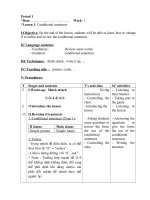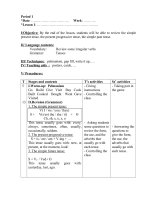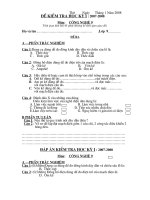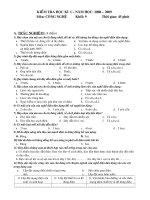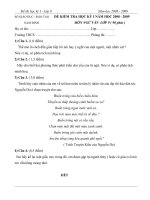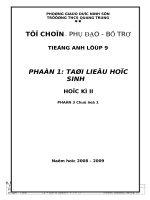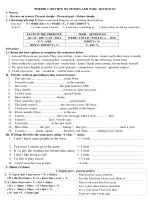GATC 9 HKI
Bạn đang xem bản rút gọn của tài liệu. Xem và tải ngay bản đầy đủ của tài liệu tại đây (149.44 KB, 20 trang )
Period 1
*Date: …………………………… Week: ………..
*Lesson 1: ……………………………………………...
I/Objective: By the end of the lesson, students will be able to review the simple
present tense, the present progressive tense, the simple past tense.
II/ Language contents:
Vocabulary: Review some irregular verbs
Grammar: Tenses
III/ Techniques: pelmanism, gap fill, write it up, …
IV/ Teaching aids : posters, cards, …
V/ Procedures:
T Stages and contents T’s activities Ss’ activities
5
13
I.Warm-up: Pelmanism
Go Build Give Visit Buy Cook
Built Cooked Bought Went Gave
Visited
II.Revision (Grammar)
1. The simple present tense:
V( I / we / you / they)
S + V(s/es) (he / she / it) + O
Ch, sh, s, x, z, o
This tense usually goes with: every,
always, sometimes, often, usually,
occasionally, seldom.
2. The present progressive tense:
S + is / are / am + V-ing + …
This tense usually goes with: now, at
present, at the moment, look!
3. The simple future tense:
S + V
2
/ Ved+ O
This tense usually goes with:
yesterday, last, ago.
- Giving
instructions
- Controlling the
class
- Asking students
some questions to
review the form,
the use, and the
adverbs that
usually go with
each tense.
- Controlling the
class
- Taking part in
the game
- Answering the
questions to
give the form,
the use, the
adverbs that
usually go with
each tense.
T Stages and contents T’s activities Ss’ activities
15
1
0
2
III/ Practice:
Supply the correct verb form:
1.Mr green always (go) to work by
bus.
2.It (not rain) in the dry season.
3.He (write) the lesson at present.
4.They (go) to the theatre last
Sunday.
5.You (find) my pen yesterday.
6.I (buy) this car 5 years ago.
7.Mary (wash) the dishes every
night.
8.Maryam (stay) with us at the
moment.
9. The children (play) football now.
10. The sun (rise) in the East and
(set) in the West.
Keys:
1. goes 2. doesn’t rain
3. is writing 4. went
5. found 6. bought
7. washes 8. is staying
9. are playing 10. rises - sets
Change into negative and
interrogative:
1. She is singing a song at the
moment.
2. He always comes to class on time.
3. Mary seldom does homework.
4. Your father lelf Hanoi in 2004.
Keys:
1. isn’t singing / Is she singing…?
2. doesn’t come / Does he come …?
3. doesn’t do / Does Mary do …?
4. didn’t leave / Did your father
leave … ?
IV/ Homework:
- Review the rest tenses
- Sticking the
poster on the
board
-Running through
- Asking sts to do
exercises
- Controlling the
class
-Getting feedback
- Sticking the
poster on the
board
-Running through
- Asking sts to do
exercises
- Controlling the
class
-Getting feedback
- Giving the task
at home
- Looking at the
poster
- Listening to
their teacher
- Giving the
correct form of
the verbs
- Comparing
- Giving the
answers
- Looking at the
poster
- Listening to
their teacher
- Changing into
negative and
interrogative
form
- Comparing
- Giving the
answers
- Listening and
copying the task
Period 2
*Date: …………………………… Week: ………..
*Lesson 2: ……………………………………………...
I/ Objective: By the end of the lesson, students will be able to review the past
progressive tense, the present perfect tense, the simple future tense.
II Language contents:
Vocabulary: Review-some old words
Grammar: Review - S + was / were + V-ing + …
- S + has / have + PP (V
3,
Ved) + O…
- S + will / shall + V
1
-
III Techniques: Gap Fill, Write it up, Ask-answer
IV Teaching aids : posters, cards, …
V Procedure:
T Stages and contents T’s activities Ss’ activities
5
1
0
I.Warm-up: Pelmanism
Go Build Give Buy Meet
Built Bought Went Gave Met
II.Revision (Grammar)
1. The past progressive tense
S + was / were + V-ing + …
*Note:this tense usually goes with: at
that time, then, at 8 o’clock
yesterday, when, while
2. The present perfect tense
S + has / have + PP (V
3,
Ved) + O…
* Note:this tense usually goes with:
just, already, lathery=recently times,
ever, not …yet up till now = so far,
since, for
3. The simple future tense
S + will / shall + V
1
+ O
* Notes: This tense usually goes with
tonight, tomorrow, next, …
- Giving
instructions
- Controlling the
class
- Asking students
some questions to
review the form,
the use, and the
adverbs that
usually go with
each tense.
- Controlling the
class
- Taking part in
the game
- Answering the
questions to
give the form,
the use, the
adverbs that
usually go with
each tense.
T Stages and contents T’s activities Ss’ activities
15
13
2
III.Practice:
Put the verbs in parentheses into
the correct tense:
1.They (buy) a new house next
month.
2.He (visit) you tomorrow.
3.He (listen) to the music at 4
o’clock yesterday.
4.You (stay) at home tonight.
5.I (live) in HCM city since I was
two.
6.You (have) breakfast recently.
7. Mrs Thoa was cooking when Lan
(arrive) home.
8. We (just meet) our teacher.
Keys:
1.will buy 2.will visit 3.was listening
4.will you stay 5.have lived
6.have you had 7. arrived 8. have
just met
Change into negative and
interrogative:
1. She will buy a house next week.
2.They were at the beach last night.
3. They have just seen that film.
4. The Pikes were having dinner at 7
o’clock last night.
Keys:
1. won’t buy / Will she buy … ?
2. weren’t / Were they … ?
3. haven’t just seen
Have they just seen … ?
4. weren’t having
Were the Pikes having … ?
IV/ Homework:
- Learn the lesson
- Sticking the
poster on the board
-Running through
- Asking sts to do
exercises
- Controlling the
class
-Getting feedback
- Sticking the
poster on the board
-Running through
- Asking sts to do
exercises
- Controlling the
class
-Getting feedback
- Giving the task at
home
- Looking at the
poster
- Listening to
their teacher
- Giving the
correct form of
the verbs
- Comparing
- Giving the
answers
- Looking at the
poster
- Listening to
their teacher
- Changing into
negative and
interrogative
form
- Comparing
- Giving the
answers
- Listening and
copying the
task
Period 3
*Date: …………………………… Week: ………..
*Lesson 3: ……………………………………………...
I. Objective: By the end of the lesson, students will be able to know “ If clauses”
and “wish clauses”
II. Language contents:
Vocabulary: Review
Grammar: Review: If clauses, wish clauses
III. Techniques : Gap Fill, Write it up, …
IV. Teaching aids: posters, …
V. Procedures:
T Stages and contents T’s activities Ss’ activities
5
15
I.Warm-up: Shark attack
W-I-S-H
II.Revision (Grammar)
1.If clauses (conditional sentences)
a. Type I: probable conditional
-If clause: simple present ( S + V
1
)
-Main clause: simple future (S + will
+ V
1
)
b.Type II: present unreal condition
-If clause: S + V
2
/Ved / be(were)+
…
-Main clause:
S + would + bare-infinitive
could
should
might
2.Wish clauses:
a.Type I: future unreal wish
S+wish(es)+S+would/could+bare-
inf…
b.Type II: present unreal wish
S+wish(es) + S + V
2
/ed / be(were)+
…
- Giving
instructions
- Controlling the
class
- Asking students
some questions to
review the form,
the use of each
clause
- Controlling the
class
- Taking part in
the game
- Answering the
questions to
give the form,
the use of each
clause
- Copying to
their notebooks
T Stages and contents T’s activities Ss’ activities
1
0
13
2
III.Practice:
1. Put the verbs in parentheses
into the correct tense:
a.If he (try) hard, he’ll pass the exam.
b.If today were Sunday, we(go) to
the beach.
c.I could understand the English
teacher if she(speak) more slowly.
d.If I finish the work in time, I(go) to
the football game.
Keys:
a.If he tries hard, he’ll pass…
b.If today………, we would go…
c.I could…………, if she spoke
d.If I ………………., I will go
2. Rewrite these sentences, using “ I
wish …”
a.They don’t study hard.
b.I can’t answer the questions.
c.I don’t have time to study.
d.She won’t visit me again.
e.Nam isn’t here.
Keys:
a.I wish they studied hard.
b.I wish I could answer the
questions.
c.I wish had time to study.
d.I wish she would visit me again.
e.I wish nam were her.
IV. Homework:
- Learn the lesson
- Sticking the
poster on the board
-Running through
- Asking sts to do
exercises
- Controlling the
class
-Getting feedback
- Sticking the
poster on the board
-Running through
- Asking sts to do
exercises
- Controlling the
class
-Getting feedback
- Giving the task at
home
- Looking at the
poster
- Listening to
their teacher
- Giving the
correct form of
the verbs
- Comparing
- Giving the
answers
- Looking at the
poster
- Listening to
their teacher
- Rewriting the
sentencs
- Comparing
- Giving the
answers
- Listening and
copying the
task
Period 4
*Date: …………………………… Week: ………..
*Lesson 4: ……………………………………………...
I. Objective: By the end of the lesson, students will be able to know how to use to-
infinitive, bare infinitive, gerund
II. Language contents:
Vocabulary: Review
Grammar: Review the structures
III. Techniques: shark attack, Gap Fill, …
IV. Teaching aids: posters, cards, …
V. Procedures:
T Stages and contents T’s activities Ss’ activities
5
2
0
I.Warm-up: Shark attack:
G-E-R-U-N-D
II.Revision (Grammar)
1. To- infinitive
a. S + ask/tell/request/beg/advise +O
+ to-infinitive
b. S + be + adj + to-infinitive
c. S + use + something + to- inf
d. S +
agree/continute/intend/try/seem
arrange/ decide/expect/ + to-inf
2. Bare infinitive:
a. S + make + obj + bare-infinitive
b. S + used to + bare-infinitive
c. S + Modal verbs + bare-infinitive
3. Gerund
a. S + enjoy
/stop/keep/hate/like/regret
/deny/finish/avoid/love/give up + V-
ing
b. S + be (get) + used to + V-ing
c. After preposition + V-ing
- Giving
instructions
- Controlling the
class
- Asking students
some questions to
review how to use
to-infinitive, bare-
infinitive, gerund
- Controlling the
class
- Taking part in
the game
- Answering the
questions to
give the ways to
use to- inf,
bare-infinitive,
gerund
- Copying to
their notebooks
T Stages and contents T’s activities Ss’ activities
23
2
III.Practice:
Use the correct form of the verbs
in parentheses:
1.I’m afraid of (cross) busy streets.
2.He asks me (prepare) the meal for
the family.
3.She tells her friend (do) this work.
4.He is happy (hear) about that.
5.I finished (read) that novel
yesterday
6.Daisy is used to(walk) to school
every morning.
7.We used to (live) in the small
village but now we live in London.
8.He can (do) these exercises.
9. He agree (pay) for the broken
windows.
10. I enjoy (play) tennis.
11. Daisy must (stay) at home.
12. You ought to (do) your
homework.
13. Are you going to give up
(smoke)?
Keys:
1.crossing 2.to prepare 3.to do 4.to
hear 5.reading 6.walking 7.live 8.do
9. to pay 10. playing 11. to stay
12. do 13. smoking
IV. Homework:
- Learn the lesson
- Sticking the
poster on the board
-Running through
- Asking sts to do
exercises
- Controlling the
class
-Getting feedback
- Giving the task at
home
- Looking at the
poster
- Listening to
their teacher
- Giving the
correct form of
the verbs
- Comparing
- Giving the
answers
- Listening and
copying the
task

